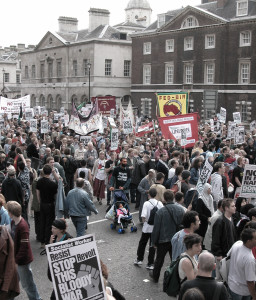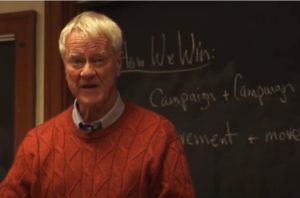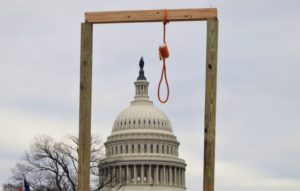By Shel Horowitz
“When someone shows you who they are, believe them the first time.”
–Maya Angelou
Despite his 20,000+ lies while in office, I believe Trump when he says he won’t cede power peacefully (at least not voluntarily). He flouts conventions and precedents constantly, has done what he can to turn the presidency into both an authoritarian dictatorship and a personal wealth spigot for him, his family, his businesses, and his cronies, and has no idea how to look beyond his own narrow self-interest to nurture the good of the country.
But here’s the thing about bullies: they crumble when they face serious organized opposition. Even Trump, for all his bluster, has about-faced many times when his crazy anti-democratic stuff met resistance.
We have hundreds of already-organized groups in this country with combined membership well into the tens of millions (including 21 listed below). If they join together to create massive public opposition and concerted action, they will be unstoppable and the Trump attempt to stay in power after he loses will fail.
What would that look like? We’ll revisit that before we’re done. But first, some context:
Nonviolent Resistance Can Stop Coups and Bring Down Governments
Trump doesn’t study history and doesn’t read his briefings—so he doesn’t realize that resistance can go a whole lot deeper than he has ever experienced. Concerted nonviolent action has brought down some pretty repressive governments—including the Communist governments of Eastern Europe and military dictatorships in Latin America, as well as the dictators of Egypt and Tunisia during the Arab Spring a few years ago. And it has reversed many coup attempts—including Germany, in 1920. And even the Nazis frequently scaled back the repression in the face of concerted nonviolent resistance.
The late Gene Sharp documented 198 separate methods of nonviolent resistance—and that was before the Internet added many more and COVID forced new creativity as it became unsafe to gather in large crowds.
Another researcher, Erica Chenoweth, discovered that when just 3.5 percent of the population actively participate in nonviolent resistance, that’s enough of a tipping point to bring down governments. She also found that more than twice as many nonviolent campaigns as violent campaigns led to political change (53% of the time, versus 26% for violent protests.
Trump has shown us who he is, over and over again.[1] Trump seems to think no laws apply to the president and has been rewarded by a Senate unwilling to set limits or consequences.
Worse yet, Trump and Senate Majority Leader Mitch McConnell have hijacked the judiciary—creating a massive long-term threat not just to environmental and human rights initiatives, but to the freedom of activists in every movement. We’ve seen protestors isolated far from the action, new laws that turn certain kinds of political action into felonies, and court decisions that reverse crucial civil rights legislation while opening the floodgates of the 2010 Citizens United decision even wider, in 2018, to “dark money” corruption of politics.
McConnell has made it very clear that his refusal to hold hearings on Merrick Garland had nothing to do with letting the American people choose and everything to do with stacking the court. And they’ve stacked the entire judiciary by refusing to confirm many Obama nominees while ramming through 218 Trump appointees to lifetime appointments on federal District, Appellate, and Supreme Court courts who will threaten our freedom for generations.
This is why they are rushing through the nomination of Amy Coney Barrett to the Supreme Court; Trump feels that a Court with three of his Justices is more likely to confirm his self-coronation, while McConnell understands that he is sentencing the country to decades more under a conservative Court that has been repealing so much of the progress we’ve made—a court far out of step with the majority of Americans. On October 5, Justices Thomas and Alito even floated the idea of reversing the right to same-sex marriage.
And Trump may be right. With three Trump picks and three long-serving conservatives out of nine Justices, the court could find a way to allow him to serve another term even after losing. It was a less conservative court in 2000 that ordered (5 to 4) a halt to the Florida recount and made George W. Bush our first unelected full-term president since Rutherford B. Hayes took office in 1877.
And that’s why doing our best to block this nomination is one of two strategies to prevent an authoritarian coup (the other happens after the election).
Step 1: Raising a Ruckus about the Supreme Court Seat
Let’s face facts: if the Republicans really want to ram this nomination through, they can (and if history tells us anything, they probably will). But if we make the costs high enough, they may choose not to—or they may shove her onto the court only to find to consequences they hadn’t planned on.
For instance, if the Republicans see that ignoring their own 2016 precedent and getting Barrett on the court will mean they drop five Senate seats, several of the 22 Republican Senators up for re-election could defect—especially if they’re among the nine Senators that Indivisible’s Payback Project has targeted to vote out of office. If getting Barrett on the Court angers enough people, it could even create an emboldened new Democratic Senate supermajority.
If the three Trump appointees are forced by massive public pressure to recuse themselves from any decisions involving the 2020 election, Senators may wonder if it’s worth the risk of a Democratic Congress raising the number of Justices to 15, giving President Joe Biden six Supreme Court seats to counterbalance this ethics travesty that started with the Garland refusal and continued with the disgraceful confirmation of Kavanaugh.
And if the inevitable suits and countersuits (or a bunch of Senators unable to work because of COVID) hold up any swearing-in until after the inauguration, Barrett (who has less than three years’ experience as a judge) won’t have a chance to repay Trump’s favor by finding a way to keep him in office.
In any case, it’s our duty to protect our increasingly fragile republic by doing what we can.
We have at least two arguments to build opposition:
- The process is blatantly unfair and completely opposite McConnell’s own precedent, and there isn’t time to conduct thorough hearings before the election; and
- The more we learn about this nominee the more we see that she is not qualified and out of the mainstream of American judicial thought.
The Process
As a constitutional lawyer, Obama should never have allowed the McConnell tactic to succeed; he could have said, “if, by X date, you haven’t held a hearing, I will take that as consent.” But he failed to stand up to this power play, and that’s now the precedent.
And this precedent gives us moral leverage to oppose this nominee named far closer to the election, as long as we maintain nonviolent discipline. Use their own words from 2016 to hold them to a higher standard—do it publicly, on their social media pages, and privately, with emails, phone calls, and postal mail. You can find those quotes at https://docs.google.com/document/d/1nnuQNpD4vPB4hjcpGDf_h-dYd0iVgR41DzJUs1frEQQ/edit .
The Nominee
Barrett has less than three years’ experience as a judge. And eight months of that time, the courts have been closed. She has no experience as a trial lawyer, either. That she is a popular law school professor doesn’t qualify her for this seat.
More concerning, we’re beginning to learn about her extremism. She has been a paid speaker at least twice for the Alliance Defending Freedom, labeled by southern Poverty Law Center as a hate group. She is not just a member but a “handmaid” of the fringe group (1800 members) People of Praise, which claims women must be subservient to their husbands in all things. She served on the board of one of its schools and lived in one of their group houses for a while. She did not disclose this membership in the paperwork for either her current Court of Appeals seat or for the Supreme Court, and the group scrubbed her name off its website. An AP article describes the group as “hierarchical, authoritarian and controlling, where men dominate their wives, leaders dictate members’ life choices and those who leave are shunned.”
Another thing she failed to disclose: she and her husband signed a newspaper ad in 2006 newspaper advertisement seeking to end “the barbaric legacy of Roe vs Wade” and claiming that many abortions were done “for social reasons.” According to Forbes, the organization behind the ad calls for criminalizing discarding of unused frozen embryos when attempting in vitro fertilization.
Remember, even Richard Nixon had to abandon two of his hard-right choices. We really need to make some noise about these extreme positions.
Time to Take Action!
Already, 150 civic groups have spoken out against this nomination, as have 41 faith groups. Even a Catholic group came out against the nomination in a strongly-worded statement that says,
Years of decisions by Judge Barrett on the Seventh Circuit Court of Appeals prove that she does not hold all life to be sacred, as we are instructed to do by Catholic Social Teaching and Pope Francis.
The next Justice who fills the seat of Ruth Bader Ginsburg must advocate for the equally sacred issues that Pope Francis calls all people of good faith to defend: the vulnerable, those in poverty, and immigrants. Until an appointee is presented who can meet this call, as Justice Ginsburg did, the Senate must not consider filling the vacancy.
To move forward with the nomination of Judge Barrett weeks before a Presidential election is an assault on our democratic system. The people and their next chosen President must decide on the next Supreme Court Justice. Catholic voters will not accept a partisan power grab by President Trump, Senator McConnell, and his Republican colleagues.
But none of that is not enough; it’s time go out into the streets with massive peaceful protest. Let’s form an activist coalition of many groups, including large national organizations like MoveOn, The Movement for Black Lives/Black Lives Matter, National Organization for Women, NAACP, Feminist Majority, CAIR (a Muslim rights organization), JStreet (a progressive Jewish organization), Natural Resources Defense Council (environmental), Sierra Club, ACLU, democracy activism groups like Common Cause, People For the American Way, Indivisible, Sunrise Movement, Our Revolution, Represent Us, Extinction Rebellion, 350.org, Code Pink, and the many others who signed that opposition letter—and of course including the Democratic Party, Progressive Democrats of America, etc.: a mix of center-left and openly progressive organizations.
That coalition should have a public presence outside the in-state and DC homes and offices of every Republican Senator who said in 2016 that it was too close to the election and the seat should be held for the winner. And that presence needs to be especially strong and vocal for those whose seats are up this year (including Graham, McConnell, and Collins, among others). With social distancing making small numbers spread over more space, a handful of people at a time is enough to have impact.
That coalition needs to actively lobby every Senator, getting the Democrats to resist and making the political consequences clear to Republicans (with stats on the combined organizational membership in their state). To reach out to the media daily. And to deluge the Republican Senators up for re-election with hundreds of phone calls (to their Washington offices and to every district office), emails, social media tweets, and in-person meeting requests to let them know that they cannot play fast and loose with our democracy, and that there will be consequences if they try. If their tax status permits, to publicly donate large sums of money to the Democratic opponents.
None of us can do this alone. But if these organizations recruited volunteers in a coordinated effort, they’d have plenty. It’s also a visibility opportunity for the participating groups.
More importantly, this coalition will be in place and functioning when we get to Step Two, Safeugarding Democracy. So if you are a member or financial supporter of any of these organizations or any that signed those condemnations of the nomination, tell their CEOs and boards to get moving with a massive coalition to protect America’s democracy.
Step 2: How We Can Safeguard Democracy After the Election
Trump has many ways to try to steal the election. In broad categories, they include 1) excluding or intimidating likely Democratic voters (like the 94,000 prevented from voting in Florida in 2000 and 16.7 million at risk this year, according to election fraud expert Greg Palast), 2) judicial and legislative intervention after-the-fact, and 3) simply refusing to give up power, figuring that the armed thugs willing to defend him will be enough.
I’m not that worried about the third category. After insulting them over and over again, Trump probably can’t rely on the military to maintain his power—and the militia groups, while scary, probably can’t do it by themselves. They would need tens of thousands of highly organized and disciplined troops willing to attack their fellow citizens, subvert the constitution, and put their own lives and liberty at risk.
Thousands of government employees charged with carrying out the day-today tasks of governance, many of whom have been resisting him internally since 2017, would withdraw cooperation. If Biden establishes a shadow government, he can run the country from some other building than the White House. We’ve learned a lot these past few months about how to work remotely.
Biden has also noted last July that “the United States government is perfectly capable of escorting trespassers out of the White House.”
It’s the other two categories that concern me. Denying likely-Democratic voters the chance to vote, or invalidating their ballots, has been a Republican tactic since at least 2000, and was used to swing Florida that year and Ohio four years later, resulting in the eight-year unelected presidency of George W. Bush. And arcane laws exist that could hand Trump another four years even if Biden wins. For example, Republican legislators might try to appoint Electoral College electors who don’t represent the party that won their state (although, as the article points out, that strategy isn’t likely to work).
Here’s how resistance might play out, led and coordinated by that same coalition of activist groups we discussed in Part 1:
- Those protests in front of Republican lawmakers’ homes and offices expanded to every collaborating member of Congress, judge, or Justice, every state legislator or governor who tries to subvert the election.
- The organizations call for a complete and comprehensive withdrawal of consent to this government’s legitimacy. Enough bureaucrats, government building security screeners, custodial staff, and air traffic controllers stop working, enough people (and their businesses) stop paying federal taxes, and enough members of the armed forces leave their posts that the federal government comes to a screeching halt. The same can be done at the state level for states that are enabling the coup. And withdrawal of cooperation is especially delightful because it’s hard to combat with reprisals, and thus appealing to non-activists who don’t want to risk their safety or their freedom.
- Those organizations schedule the less risk-averse to mobilize in the streets, to shut down DC’s grand boulevards, to surround the White House perimeter fence with an ongoing presence—and to replace any who are arrested with another wave. Just as in the Civil Rights movement, filling the jails helps immobilize the government, and eventually, they will have no place left to put the new detainees.
- They call on the UN to delegitimize the rogue government internationally. Trump doesn’t get to meet with foreign dignitaries, who seek out meetings with Biden instead. The US temporarily loses its votes at the UN until democracy is restored, as Peter Beinart suggested in a New York Times Op-Ed. Overtures by US diplomats are ignored. International troops arrive to keep the peace.
- Biden and Harris find a Supreme Court Justice to administer the Oath of Office in a televised public ceremony and begin setting up the shadow Cabinet and taking control of the bureaucracy (there is no Constitutional requirement that the Chief Justice is the one who administers it). Trump is marginalized until he can be arrested for treason (and tax fraud, emoluments violations, and all the rest of it).
In the few months remaining before all this might boil over, it’s time for each of us to get ready—starting with the easy and obvious steps that any of us can take:
- Sign this petition calling on all those pro-democracy groups to organize a coalition to block the Barrett nomination and protect democracy after the election
- Personally contact any organizations you belong to or donate to and ask them to join the coalition. Write letters, make phone calls, send Tweets
- Contact your own two Senators and Representative in Congress. Ask for meetings with them and bring a delegation that includes two or three very knowledgeable people as well as supporters who can get loud if that becomes necessary. Ideally, this group should have members from different organized communities and ethnic or subculture groups within the district.
If your Senators are Democrats or independents, ask that they do whatever they can to block a vote on the Barrett nomination until after January 20. If they are Republicans, tell them you demand the same courtesy to the American people that they demanded in 2016, and make it clear that if they vote to confirm, you will not only vote against them but urge others to do so.
And think about whether you’re prepared for deeper steps that could have personal consequences, such as jail, physical injury, seizure of your property:
The most important thing is mindset. People will tell you there’s nothing you can do to stop fascism—but they’re wrong. For millennia, people have organized successfully for justice, for peace, for the environment, for the space to be themselves. I personally started the movement that saved a mountain while the “experts” moaned, “there’s nothing we can do!” Those who believe they can win increase their chances of winning.
A lifelong activist, profitability and marketing specialist Shel Horowitz’s mission is to fix crises like hunger, poverty, racism, war, and catastrophic climate change—by showing the business world how fixing them can make a profit. An author, international speaker, and TEDx Talker, his award-winning 10th book, Guerrilla Marketing to Heal the World, lays out a blueprint for creating and MARKETING those profitable change-making products and services. He is happy to help you craft your messaging and develop profit strategies. Learn more (and download excerpts from the book) at http://goingbeyondsustainability.com
[1] Trump has actively sabotaged hundreds of progressive or liberal policies implemented over the past several decades (Trump’s environmental record alone would be reason to get him out of office). He is increasingly open in his racism, his attacks on women, people with disabilities, Muslims, Arabs, veterans, and so many others (even his own former Cabinet members). He is brazen in his financial corruption, his ignorance of his office, and his rudeness to our allies while cozying up to brutal dictators around the world.









